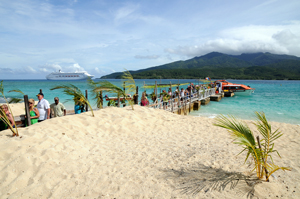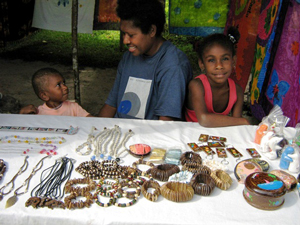Pacific Islanders will be able to earn more money from tourists visiting on cruise ships following the signing of an agreement between AusAID and Australian company Carnival Australia.
AusAID Director General Peter Baxter and CEO of Carnival Australia Ann Sherry today signed a memorandum of understanding to work together on improving the livelihoods of people in the Pacific.
The Prime Minister of Vanuatu, Moana Carcasses, attended the signing of the agreement, which outlines several areas for collaboration with Carnival Australia to improve business prospects in Vanuatu, followed by Papua New Guinea.
These activities include increasing access to the lucrative cruise tourist market for local producers through improved infrastructure for visitors, and providing vocational education and training to local vendors in areas such as hospitality and financial management.
'AusAID is very pleased to be partnering with an organisation that plays a vital role in promoting the benefits of tourism in the Pacific region,' Mr Baxter said.
'This agreement identifies areas where AusAID and Carnival Australia can partner to help translate the economic benefits of tourism to the region into better incomes and employment opportunities for Pacific Islanders.'
Mr Baxter said the presence of Mr Carcasses was a positive endorsement of the business and development partnership that exists between Australia and Vanuatu.
Cruise ships contribute $34 million to Pacific economies. This contribution is expected to grow to around $100 million a year within 10 years. Carnival Australia's cruises account for 80 per cent of tourist arrivals in Vanuatu, with the number of ship arrivals more than doubling in recent years.
Carnival Australia is planning to bring 230,000 Australians to Vanuatu in 2013.
AusAID previously partnered with the company in 2009 under the Enterprise Challenge Fund [external link]. AusAID provided it with a grant to increase tourism to Vanuatu and generate economic opportunities for local communities. The project improved on-shore facilities, such as toilets, for cruise ship passengers on Mystery Island, Wala Island and Champagne Beach, and trained local traders in hospitality and financial management.
The private sector is widely recognised as a major catalyst for international development. It has the power to boost economic activity and reduce poverty. Strengthening links with businesses in both Australia and the region is a key commitment of the Australian aid program.


